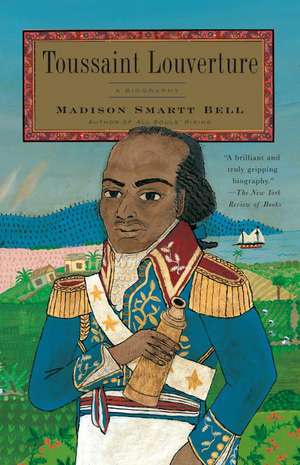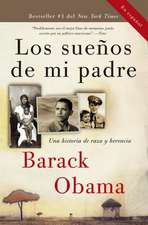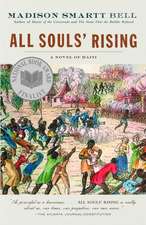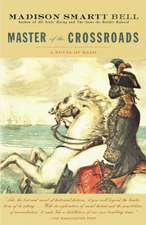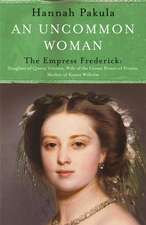Toussaint Louverture: A Biography
Autor Madison Smartt Bellen Limba Engleză Paperback – 31 ian 2008
Preț: 117.58 lei
Nou
Puncte Express: 176
Preț estimativ în valută:
22.50€ • 23.41$ • 18.58£
22.50€ • 23.41$ • 18.58£
Carte disponibilă
Livrare economică 24 martie-07 aprilie
Preluare comenzi: 021 569.72.76
Specificații
ISBN-13: 9781400079353
ISBN-10: 1400079357
Pagini: 333
Ilustrații: MAP
Dimensiuni: 134 x 203 x 21 mm
Greutate: 0.25 kg
Editura: Vintage Books USA
ISBN-10: 1400079357
Pagini: 333
Ilustrații: MAP
Dimensiuni: 134 x 203 x 21 mm
Greutate: 0.25 kg
Editura: Vintage Books USA
Notă biografică
Madison Smartt Bell has published twelve novels and two collections of short stories. His novels include Soldier's Joy, Dr. Sleep, Ten Indians, and Save Me, Joe Louis. His eighth novel, All Souls' Rising, was a finalist for the National Book Award and the PEN/Faulkner Award. Bell, a Professor of English and Director of the Kratz Center for Creative Writing at Goucher College, lives in Maryland with his family.
Extras
Chapter One: Opening the Gate
On August 29, 1793, a curious proclamation emerged from Camp Turel, one of numerous small fortified positions in the mountain range that runs from Gonaïves on Saint Domingue’s west coast eastward to the Central Plateau and the Spanish frontier, and which had been occupied, since 1791, mostly by groups of revolting slaves, but sometimes by French soldiers and militiamen who were trying to suppress the revolt. The proclamation was a brief one:
"Brothers and Friends,
I am Toussaint Louverture; perhaps my name has made itself known to you. I have undertaken vengeance. I want Liberty and Equality to reign in Saint Domingue. I am working to make that happen. Unite yourselves to us, brothers, and fight with us for the same cause.
Your very humble and obedient servant,
(Signed)
Toussaint Louverture.
General of the armies of the king, for the public good."
Probably this proclamation was not the first time that the man formerly known as Toussaint Bréda had used the new surname Louverture, since it assumes that the name may already be known to his audience—but if it is not the very first time he entered this new identity into the written record, it is the first time he deliberately announced it to the general public.
Not by coincidence, August 29 was also the date that Léger Félicité Sonthonax, commissioner and chief representative of the French government then in Saint Domingue, proclaimed the abolition of slavery in the colony. The newly minted Toussaint Louverture was then officially part of the Spanish army; Spain was at war with France, and the colonists of Spanish Santo Domingo had adopted the rebel slaves of the French colony as auxiliaries to their own military. Thus, in the close of his proclamation, Toussaint was probably referring to the king of Spain, though his clustering of the words “liberty,” “equality,” and “brothers” is an intentional echo of the most familiar phrase of the French Revolution, “liberté, égalité, fraternité.” Moreover, and somewhat confusingly, the rebel slaves of Saint Domingue had been claiming loyalty to the king of France almost from the moment of their first rising.
Since the fall of 1791, Toussaint had been in the mountains with the revolting slaves, though before 1793 his role was not obviously prominent. The proclamation of Camp Turel was his first deliberate effort to call attention to himself and the part he intended to play. Though Toussaint had been fighting a guerrilla war against the French for nearly two years, the timing of the proclamation suggests that he must have known in advance that Sonthonax would abolish slavery and when he was going to do it. What he meant to convey, in his lines and between them, was that Toussaint Louverture, a black man born into slavery in the colony, was the true apostle of liberty here—not the white commissioner Sonthonax, who had only recently arrived from France.
Toussaint Bréda had been a trusted retainer on Bréda Plantation, near Haut du Cap, and only a short distance from the port of Cap Français. He served as coachman for Bréda’s French manager, Bayon de Libertat—an important role, since coachmen often carried messages for their masters, alone and on their own responsibility. In his additional role of commandeur, Toussaint enjoyed considerable authority over the majority of more ordinary slaves on the plantation. Such commandeurs were responsible for organizing and directing work gangs and often had other managerial duties. Surprisingly, they were allowed to carry swords, as an emblem of their authority and perhaps as a practical tool of enforcement as well.
Nocturnal gatherings of Saint Domingue’s slaves were prohibited in theory, but often tolerated in practice, as a means of defusing tensions that might otherwise be released in the rebellion which all the French colonists had excellent reason to fear. Commonly called “calenda,” these gatherings featured drumming and dancing and sometimes competitive stick-fighting and were officially regarded by the French as innocuous peasant dances—though some observers did report that rituals drawn from African religion were performed on these occasions.
On the night of August 14, 1791, an assembly of commandeurs took place in a wooded area called Bois Caïman, or Crocodile Forest, part of the Lenormand de Mézy Plantation in Morne Rouge, on the border of the richest cane-growing area in all Saint Domingue, the Northern Plain. The commandeurs came from all the important plantations of the Northern Plain and the foothills surrounding it: Limbé, Quartier Morin, Petite Anse, Port Margot, and Limonade. Their purpose, confessed to the French colonists by a couple of conspirators captured several days later, was to plan an enormous insurrection that would lay waste to the entire Northern Department of Saint Domingue and annihilate the white population.
This practical purpose of the meeting at Bois Caïman was set down on paper by European reporters, soon after the fact; Haitian oral tradition holds, with equal conviction, that the most important event that took place there was a huge Vodou ceremony. In real time, it had taken a century of slavery in Saint Domingue to consolidate the religions of various African tribes (along with a dusting of the Catholicism to which all slaves were theoretically supposed to be converted) into a single religion which all the slaves could share. The legend of Bois Caïman makes this transformation happen in one apocalyptic day.
Vodou practitioners believe that the souls of the dead do not depart. Instead they go into a parallel universe invisible to the living, but quite nearby—and not impossible to reach. Ceremonial observance begins with opening the gateways between the visible and the invisible worlds. When the passage is open, spirits constituted from the vast reservoir of spiritual energy into which the souls of the dead have pooled begin to pass through it into the world of the living. These spirits, called either lwa or zanj, cover the range of personalities of any polytheistic pantheon, or may as easily be identified with the archetypes of the collective unconscious. Aided by hypnotic chanting and drumming, the lwa take possession of the bodies of their human believers and servants, suppressing the individual consciousness of the people they “mount” and often endowing them with superhuman powers for the duration of the ride. Tradition has it that the angriest, most warlike spirits appeared at Bois Caïman: Ogoun Ferraille, Ezili Gé Rouj. The lwa lent their power to the rebellion being planned; a black pig was sacrificed to seal the compact.
Toussaint Bréda belonged to the class of commandeurs who presented themselves as leaders of the insurrection, but whether he attended the meeting at Bois Caïman has never been known for sure. Almost certainly, given his position of trust and authority among both blacks and whites, among slaves and free, he would have been well aware of which way the winds were blowing and that an insurrection was being planned. As for the Vodou element of the meeting, Toussaint’s ostentatiously devout Catholicism might have kept him away from any African, pagan rite. On the other hand, from the 1700s until now, many if not most blacks in Haiti have practiced Vodou and Catholicism simultaneously with next to no discomfort or sense of paradox in the combination. In fact, the two practices are often seen as different aspects of the same religion.
If Toussaint was present at Bois Caïman, he remained invisibly in the background. A slave named Boukman Dutty presided; he had been sold, as a troublemaker, from Jamaica. Most likely his offense was sorcery. Legend claims that he was one of the comparatively few Muslim slaves in the West Indies and that his name is a slight French distortion of the English “Bookman,” which implies that he knew how to read. Other commandeurs known to have been present are Jean-François Papillon, Georges Biassou, and Jeannot Billet; these three and Boukman himself were the most prominent leaders in the first weeks of the insurrection, which broke out with explosive violence on the night of August 22.
By dawn of August 23, the whole Northern Plain was devastated, the cane fields and sugar refineries ablaze. The disaster was first announced to Cap Français by the arrival of a rolling cloud of black smoke, out of which the first battered refugees emerged. Any whites who could not escape to the fortified towns of the coast were slaughtered, some sawed in half between planks, others strung up on steel hooks by their jawbones, still others simply hacked to pieces or burned alive in their houses. Haitian historians have argued that the reports of fetuses cut from the womb and of infants impaled and carried on pikes amount to no more than French propaganda, but such atrocities were also reported during white French reprisals on the gens de couleur in the aftermath of the Ogé rebellion. Murderous assaults on the newborn and unborn occur the world over as signals of genocidal intent. The August 1791 uprising was among other things the first engagement in a three-way genocidal race war in which each of Saint Domingue’s three races—the white, the black, and the gens de couleur—would do its absolute worst to exterminate the other two.
No one has ever been able to say for certain just where Toussaint Bréda was during this initial tumult. If he did have a hand in the August insurrection, he kept it very well hidden. In the midst of the bloody, fiery vengeance that the rebel slaves were taking on their masters, some slaves remained loyally on their plantations and did their best to protect the white families there. Apparently Toussaint remained quietly at Bréda Plantation for at least one month after the rebellion first erupted in late August. Curiously, the river of fire and blood flowing over the Northern Plain to lap against the hastily bolstered fortifications of Le Cap seems to have parted around Bréda, leaving it more or less intact. Still more curiously, only 22 of Bréda’s 318 slaves decamped in the early days of the rebellion. The rest stayed—with Toussaint—to protect the plantation and its white mistress, Madame de Libertat.
In 1799 a letter appeared in the French newspaper Le Moniteur, describing Toussaint’s conduct during the turbulence of 1791. Though unsigned, it could hardly have been written by anyone other than Bréda’s manager, Bayon de Libertat:
"Eight days before the insurrection on the Le Cap plain, some blacks of the neighboring plantation set fire to four fields of cane . . . I was at that moment on my plantation seven leagues distant from Le Cap; Toussaint and the commandeur Bruno, invariably attached to the interests of their masters, succeeded in stopping the fire without any other help than that of the blacks of the plantation. When I arrived the next evening, all the scorched cane had been cut and pressed, and they were just finishing cooking the sugar which had been extracted from it. Toussaint came before me with a pained expression and said, “We have had an accident, but don’t alarm yourself, the loss is not serious; I wanted to spare you the sight of it when you arrived, but you have come too soon.” I leave it to the reader to weigh these words.
Toussaint displayed an inexpressible joy to see me constantly in the midst of the blacks, giving them my orders to arouse their vigilance and their courage—and this at a time when it was enough to be white to be massacred."
Toussaint’s ability to keep order and conduct business as usual, in the midst of the anarchy that had engulfed the surrounding region, seems altogether extraordinary. But sometime in the fall of 1791, he left Bréda, crossed the ash-strewn ruins of the Northern Plain, and went up into the mountains of Grande Rivière, where he joined a band of rebel slaves led by Biassou. At first he served Biassou as a secretary; later he was given the title of médecin général, or general doctor. At Bréda Plantation and the surrounding area, Toussaint had the reputation of an excellent veterinarian, especially for horses, and he was also recognized as a doktè fey—literally “leaf doctor.” Along with substantial skill in African/Creole herbal medicine, he seems to have had some instruction in European doctoring.
If Toussaint did any fighting when he first joined Biassou, he was not much noticed as a leader; no white observers picked him out of the fray. However, a couple of his surviving letters suggest that he already had more authority among the rebels than he wanted to be known outside that group. To Biassou he writes on October 4, 1791:
"My dear friend,
I have received your letter with pleasure; I cannot agree to your rendezvous; we are not able to leave our camp, for both of us to travel to meet the Spaniard. If this Spaniard has something to communicate to me, he has only to get himself to my camp; as for myself, I don’t have time to appear; I wish you the most perfect health and am for life your friend."
Though Toussaint modestly signs this letter “Médecin Général,” at a time when Jean-François and Biassou had declared themselves “Généralissime” and the like, there is no sign that he was under Biassou’s orders—on the contrary, the message seems to pass between equals. Later on, when relations between the rebel slaves and the military of Spanish Santo Domingo had become more official, Toussaint would explain himself more fully to the Spanish colonial governor: “I reported and accounted for my operations to General Biassou, not at all because I considered myself to be his subordinate, but for love of the good, being familiar with his impetuous, muddle-headed, thoughtless character, likely to do more harm than good, as he demonstrated under all circumstances.”
Toussaint wrote to Biassou again on October 15, 1791, referring obscurely to what seems to have been a planned attack on the outskirts of Cap Français, if not on the town itself. The letter implies, though lightly, that Biassou may have been pushed too far in this direction by the rebels’ Spanish contacts; in the event, the attack did not take place:
"My Very Dear Friend,
After the requests which I have just made to the Spaniard, and as I am waiting day by day for the things which I asked for, I beg you to wait until we should be in better shape before we undertake what you have had the friendliness to write me about. I would very much like to go for it, but I would like to have, on all the plantations, enough crowbars to roll rocks down from the mountains of Haut du Cap, to hinder them [the enemy] from approaching us, for I believe there is no other way, unless we expose our people to butchery. I beg you to make certain that you will have the spy you have sent explain very well the location of the powder magazine of Haut du Cap, so that we can succeed in seizing the powder; my good friend, you can see from the above that I am taking every precaution in this affair; and you may say as much to Boukman; as for Jean-François he can always keep going on carriage rides with the ladies, and he has not even done me the honor to write me a word for several days. I am even astounded by that. If you need rum, I will send it to you whenever you want, but be careful how you manage it; you know that you must not give them [the rank and file of the rebel slaves] so much that they are deranged by it. Send me some carts, for I need them to haul wood to build cabins at La Tannerie to house my people."
From the Hardcover edition.
On August 29, 1793, a curious proclamation emerged from Camp Turel, one of numerous small fortified positions in the mountain range that runs from Gonaïves on Saint Domingue’s west coast eastward to the Central Plateau and the Spanish frontier, and which had been occupied, since 1791, mostly by groups of revolting slaves, but sometimes by French soldiers and militiamen who were trying to suppress the revolt. The proclamation was a brief one:
"Brothers and Friends,
I am Toussaint Louverture; perhaps my name has made itself known to you. I have undertaken vengeance. I want Liberty and Equality to reign in Saint Domingue. I am working to make that happen. Unite yourselves to us, brothers, and fight with us for the same cause.
Your very humble and obedient servant,
(Signed)
Toussaint Louverture.
General of the armies of the king, for the public good."
Probably this proclamation was not the first time that the man formerly known as Toussaint Bréda had used the new surname Louverture, since it assumes that the name may already be known to his audience—but if it is not the very first time he entered this new identity into the written record, it is the first time he deliberately announced it to the general public.
Not by coincidence, August 29 was also the date that Léger Félicité Sonthonax, commissioner and chief representative of the French government then in Saint Domingue, proclaimed the abolition of slavery in the colony. The newly minted Toussaint Louverture was then officially part of the Spanish army; Spain was at war with France, and the colonists of Spanish Santo Domingo had adopted the rebel slaves of the French colony as auxiliaries to their own military. Thus, in the close of his proclamation, Toussaint was probably referring to the king of Spain, though his clustering of the words “liberty,” “equality,” and “brothers” is an intentional echo of the most familiar phrase of the French Revolution, “liberté, égalité, fraternité.” Moreover, and somewhat confusingly, the rebel slaves of Saint Domingue had been claiming loyalty to the king of France almost from the moment of their first rising.
Since the fall of 1791, Toussaint had been in the mountains with the revolting slaves, though before 1793 his role was not obviously prominent. The proclamation of Camp Turel was his first deliberate effort to call attention to himself and the part he intended to play. Though Toussaint had been fighting a guerrilla war against the French for nearly two years, the timing of the proclamation suggests that he must have known in advance that Sonthonax would abolish slavery and when he was going to do it. What he meant to convey, in his lines and between them, was that Toussaint Louverture, a black man born into slavery in the colony, was the true apostle of liberty here—not the white commissioner Sonthonax, who had only recently arrived from France.
Toussaint Bréda had been a trusted retainer on Bréda Plantation, near Haut du Cap, and only a short distance from the port of Cap Français. He served as coachman for Bréda’s French manager, Bayon de Libertat—an important role, since coachmen often carried messages for their masters, alone and on their own responsibility. In his additional role of commandeur, Toussaint enjoyed considerable authority over the majority of more ordinary slaves on the plantation. Such commandeurs were responsible for organizing and directing work gangs and often had other managerial duties. Surprisingly, they were allowed to carry swords, as an emblem of their authority and perhaps as a practical tool of enforcement as well.
Nocturnal gatherings of Saint Domingue’s slaves were prohibited in theory, but often tolerated in practice, as a means of defusing tensions that might otherwise be released in the rebellion which all the French colonists had excellent reason to fear. Commonly called “calenda,” these gatherings featured drumming and dancing and sometimes competitive stick-fighting and were officially regarded by the French as innocuous peasant dances—though some observers did report that rituals drawn from African religion were performed on these occasions.
On the night of August 14, 1791, an assembly of commandeurs took place in a wooded area called Bois Caïman, or Crocodile Forest, part of the Lenormand de Mézy Plantation in Morne Rouge, on the border of the richest cane-growing area in all Saint Domingue, the Northern Plain. The commandeurs came from all the important plantations of the Northern Plain and the foothills surrounding it: Limbé, Quartier Morin, Petite Anse, Port Margot, and Limonade. Their purpose, confessed to the French colonists by a couple of conspirators captured several days later, was to plan an enormous insurrection that would lay waste to the entire Northern Department of Saint Domingue and annihilate the white population.
This practical purpose of the meeting at Bois Caïman was set down on paper by European reporters, soon after the fact; Haitian oral tradition holds, with equal conviction, that the most important event that took place there was a huge Vodou ceremony. In real time, it had taken a century of slavery in Saint Domingue to consolidate the religions of various African tribes (along with a dusting of the Catholicism to which all slaves were theoretically supposed to be converted) into a single religion which all the slaves could share. The legend of Bois Caïman makes this transformation happen in one apocalyptic day.
Vodou practitioners believe that the souls of the dead do not depart. Instead they go into a parallel universe invisible to the living, but quite nearby—and not impossible to reach. Ceremonial observance begins with opening the gateways between the visible and the invisible worlds. When the passage is open, spirits constituted from the vast reservoir of spiritual energy into which the souls of the dead have pooled begin to pass through it into the world of the living. These spirits, called either lwa or zanj, cover the range of personalities of any polytheistic pantheon, or may as easily be identified with the archetypes of the collective unconscious. Aided by hypnotic chanting and drumming, the lwa take possession of the bodies of their human believers and servants, suppressing the individual consciousness of the people they “mount” and often endowing them with superhuman powers for the duration of the ride. Tradition has it that the angriest, most warlike spirits appeared at Bois Caïman: Ogoun Ferraille, Ezili Gé Rouj. The lwa lent their power to the rebellion being planned; a black pig was sacrificed to seal the compact.
Toussaint Bréda belonged to the class of commandeurs who presented themselves as leaders of the insurrection, but whether he attended the meeting at Bois Caïman has never been known for sure. Almost certainly, given his position of trust and authority among both blacks and whites, among slaves and free, he would have been well aware of which way the winds were blowing and that an insurrection was being planned. As for the Vodou element of the meeting, Toussaint’s ostentatiously devout Catholicism might have kept him away from any African, pagan rite. On the other hand, from the 1700s until now, many if not most blacks in Haiti have practiced Vodou and Catholicism simultaneously with next to no discomfort or sense of paradox in the combination. In fact, the two practices are often seen as different aspects of the same religion.
If Toussaint was present at Bois Caïman, he remained invisibly in the background. A slave named Boukman Dutty presided; he had been sold, as a troublemaker, from Jamaica. Most likely his offense was sorcery. Legend claims that he was one of the comparatively few Muslim slaves in the West Indies and that his name is a slight French distortion of the English “Bookman,” which implies that he knew how to read. Other commandeurs known to have been present are Jean-François Papillon, Georges Biassou, and Jeannot Billet; these three and Boukman himself were the most prominent leaders in the first weeks of the insurrection, which broke out with explosive violence on the night of August 22.
By dawn of August 23, the whole Northern Plain was devastated, the cane fields and sugar refineries ablaze. The disaster was first announced to Cap Français by the arrival of a rolling cloud of black smoke, out of which the first battered refugees emerged. Any whites who could not escape to the fortified towns of the coast were slaughtered, some sawed in half between planks, others strung up on steel hooks by their jawbones, still others simply hacked to pieces or burned alive in their houses. Haitian historians have argued that the reports of fetuses cut from the womb and of infants impaled and carried on pikes amount to no more than French propaganda, but such atrocities were also reported during white French reprisals on the gens de couleur in the aftermath of the Ogé rebellion. Murderous assaults on the newborn and unborn occur the world over as signals of genocidal intent. The August 1791 uprising was among other things the first engagement in a three-way genocidal race war in which each of Saint Domingue’s three races—the white, the black, and the gens de couleur—would do its absolute worst to exterminate the other two.
No one has ever been able to say for certain just where Toussaint Bréda was during this initial tumult. If he did have a hand in the August insurrection, he kept it very well hidden. In the midst of the bloody, fiery vengeance that the rebel slaves were taking on their masters, some slaves remained loyally on their plantations and did their best to protect the white families there. Apparently Toussaint remained quietly at Bréda Plantation for at least one month after the rebellion first erupted in late August. Curiously, the river of fire and blood flowing over the Northern Plain to lap against the hastily bolstered fortifications of Le Cap seems to have parted around Bréda, leaving it more or less intact. Still more curiously, only 22 of Bréda’s 318 slaves decamped in the early days of the rebellion. The rest stayed—with Toussaint—to protect the plantation and its white mistress, Madame de Libertat.
In 1799 a letter appeared in the French newspaper Le Moniteur, describing Toussaint’s conduct during the turbulence of 1791. Though unsigned, it could hardly have been written by anyone other than Bréda’s manager, Bayon de Libertat:
"Eight days before the insurrection on the Le Cap plain, some blacks of the neighboring plantation set fire to four fields of cane . . . I was at that moment on my plantation seven leagues distant from Le Cap; Toussaint and the commandeur Bruno, invariably attached to the interests of their masters, succeeded in stopping the fire without any other help than that of the blacks of the plantation. When I arrived the next evening, all the scorched cane had been cut and pressed, and they were just finishing cooking the sugar which had been extracted from it. Toussaint came before me with a pained expression and said, “We have had an accident, but don’t alarm yourself, the loss is not serious; I wanted to spare you the sight of it when you arrived, but you have come too soon.” I leave it to the reader to weigh these words.
Toussaint displayed an inexpressible joy to see me constantly in the midst of the blacks, giving them my orders to arouse their vigilance and their courage—and this at a time when it was enough to be white to be massacred."
Toussaint’s ability to keep order and conduct business as usual, in the midst of the anarchy that had engulfed the surrounding region, seems altogether extraordinary. But sometime in the fall of 1791, he left Bréda, crossed the ash-strewn ruins of the Northern Plain, and went up into the mountains of Grande Rivière, where he joined a band of rebel slaves led by Biassou. At first he served Biassou as a secretary; later he was given the title of médecin général, or general doctor. At Bréda Plantation and the surrounding area, Toussaint had the reputation of an excellent veterinarian, especially for horses, and he was also recognized as a doktè fey—literally “leaf doctor.” Along with substantial skill in African/Creole herbal medicine, he seems to have had some instruction in European doctoring.
If Toussaint did any fighting when he first joined Biassou, he was not much noticed as a leader; no white observers picked him out of the fray. However, a couple of his surviving letters suggest that he already had more authority among the rebels than he wanted to be known outside that group. To Biassou he writes on October 4, 1791:
"My dear friend,
I have received your letter with pleasure; I cannot agree to your rendezvous; we are not able to leave our camp, for both of us to travel to meet the Spaniard. If this Spaniard has something to communicate to me, he has only to get himself to my camp; as for myself, I don’t have time to appear; I wish you the most perfect health and am for life your friend."
Though Toussaint modestly signs this letter “Médecin Général,” at a time when Jean-François and Biassou had declared themselves “Généralissime” and the like, there is no sign that he was under Biassou’s orders—on the contrary, the message seems to pass between equals. Later on, when relations between the rebel slaves and the military of Spanish Santo Domingo had become more official, Toussaint would explain himself more fully to the Spanish colonial governor: “I reported and accounted for my operations to General Biassou, not at all because I considered myself to be his subordinate, but for love of the good, being familiar with his impetuous, muddle-headed, thoughtless character, likely to do more harm than good, as he demonstrated under all circumstances.”
Toussaint wrote to Biassou again on October 15, 1791, referring obscurely to what seems to have been a planned attack on the outskirts of Cap Français, if not on the town itself. The letter implies, though lightly, that Biassou may have been pushed too far in this direction by the rebels’ Spanish contacts; in the event, the attack did not take place:
"My Very Dear Friend,
After the requests which I have just made to the Spaniard, and as I am waiting day by day for the things which I asked for, I beg you to wait until we should be in better shape before we undertake what you have had the friendliness to write me about. I would very much like to go for it, but I would like to have, on all the plantations, enough crowbars to roll rocks down from the mountains of Haut du Cap, to hinder them [the enemy] from approaching us, for I believe there is no other way, unless we expose our people to butchery. I beg you to make certain that you will have the spy you have sent explain very well the location of the powder magazine of Haut du Cap, so that we can succeed in seizing the powder; my good friend, you can see from the above that I am taking every precaution in this affair; and you may say as much to Boukman; as for Jean-François he can always keep going on carriage rides with the ladies, and he has not even done me the honor to write me a word for several days. I am even astounded by that. If you need rum, I will send it to you whenever you want, but be careful how you manage it; you know that you must not give them [the rank and file of the rebel slaves] so much that they are deranged by it. Send me some carts, for I need them to haul wood to build cabins at La Tannerie to house my people."
From the Hardcover edition.
Recenzii
“A brilliant and truly gripping biography.” —The New York Review of Books“Epic. . . .The best biography of Toussaint yet.” —The New York Times Book Review“Bell has stripped away the myths—demonology as well as hagiography—to give us a nuanced, sympathetic portrait of a complicated, tragic, but undeniably heroic figure.” —Minneapolis Star-Tribune“An excellent introduction to one of the great, if elusive, personalities of history.” —The Boston Review
Descriere
In this fascinating biography, the first about Toussaint Louverture to appear in English in more than 50 years, Bell combines a novelist's passion for his subject with a deep knowledge of the historical milieu that produced the man known either as a martyr of the Haitian revolution or as the instigator of one of history's most savagely violent events.
